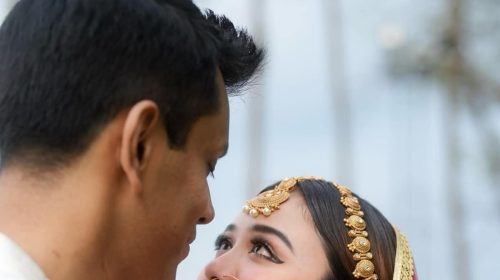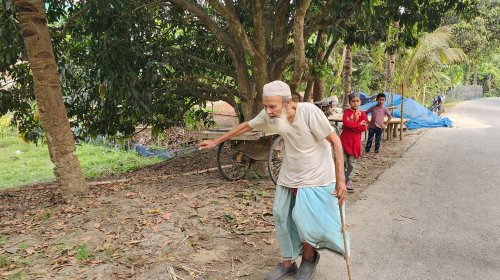Raj Nakarek, a toddler boy, can now speak the ‘Mandi’ language. He has understood the right to express his emotions in his mother tongue. Even three years ago Raj Nakarek could not speak his mother tongue Mandi. Instead of his mother tongue, Bengali is scarred in the young mind. Because; As mother Lipma Nakarek and father Jenawardhan Dalbat were employed in Dhaka, Raj Nakarek also had to be admitted in Dhaka. Here all his classmates were Bengalis. So there was no opportunity to study Mandi language.
Two years ago, Raj was admitted to Sadhu Maryam Missionary Primary School in Madhupur Upazila of his village Tangail as pre-primary to acquaint him with his own language and culture. There is an opportunity to study in the Garo language in Roman script. Raj can now fluently describe odd numbers perfectly in his own language. Apart from this, the birds, the mountains and the flowing river sing melodious songs with a sweet voice, with a smile on their face.
It is the second highest mandi bus in Bangladesh
The Garos prefer to identify themselves as ‘Mandi’. According to them, the name Garo is imposed on others. The Garo tribe lives in the Greater Mymensingh, Netrakona, Sherpur, Jamalpur, Sylhet, Sunamganj, Moulvibazar, Gazipur and Madhupur areas of Tangail in Bangladesh. According to 2022 statistics, there are 76 thousand 846 Garo tribals living in Bangladesh. However, most of the Garos live in Meghalaya, India. The original religion of the Garos or Mandis was sangsarek religion i.e. they were nature-worshippers, worshiping nature was their main religion. At the end of the 19th century, Australian Baptist missionaries began to spread Christianity among the Garos. At that time they started converting to Christianity. At present most of them practice Christianity. As a result, there has been a lot of change in their social rules and rituals. Other cultures of the Garos like language and early religious practices are also facing crisis of existence. Matriarchal society, traditional song and dance, marriage customs have changed a lot now. The original profession is on the verge of being lost in the existential struggle for life and livelihood. As they don’t have any museum of their own, they have no opportunity to present their traditions and culture in front of everyone.
Mandi community is leaving home
There are many small ethnic groups living in the Madhupur area and the border areas including the Garo community. With deforestation, their livelihood, livelihood, culture are all affected. Poverty prevails everywhere as forest livelihoods are disrupted by population growth. Once they sold their houses and moved due to scarcity, but now thousands of Garo men and women of Mandi community are leaving the forest and border homes to move to the city in search of work. According to Sulekha Mrong, Director of Achikmichik Society, Garo girls leave school, leave villages and go to cities to feed their parents after their studies stop due to poverty. Girls work as beauticians in parlors—brushing cotton to bring out beauty and grace.
“Matriarchy” is now on paper
The Garos of Meghalaya still believe in the matriarchal family. Women are the head of the family in this community. However, Garo women in Bangladesh are often powerless. Although matriarchy is present in words or in books, in reality matriarchy is not practiced in their society and family. Although the concept of single mother is considered very modern in the world, the Garos have never considered any child as illegitimate. Jihuda Mrong works in a parlor in Dhaka. He said that the decision of the family, empowerment, arbitration and judicial system of the society, property ownership or other matters are now the main decision of men. Although there are opinions of both men and women in the family and society, the opinion of men is considered final.
The strange custom of marriage has decreased
If a Mandi woman becomes a widow, she is remarried. But if that woman has a daughter, she has to face a strange rule. If the woman’s daughter is a minor, she starts calling her stepfather as ‘father’. When the daughter becomes of age i.e. when she becomes marriageable, her stepfather is given in marriage to her. From then on, the daughter started calling him ‘bar’ instead of ‘father’. If the daughter is not a minor at the time of the mother’s marriage, then the stepfather gets married to her soon after the mother’s marriage. There have been several cases now, where several women of this community have opposed this custom and thus refused to marry their stepfather. But even in some areas this custom is still in operation.
The name of the festival is ‘Wangala’.
Wangala is the most important festival of the Mandis or Garos. This festival is usually held at the end of monsoon and before winter, after harvesting the new crops. The nakma (village head) calls a meeting and fixes the day of the festival. Before this they are forbidden to eat new food grains. To celebrate the day, Garo boys and girls dance to the beat of long oval drums in colorful costumes and with bird feathers on their heads. It is the main entertainment day of the year for the Garos. All the Garo Hills became resounding with chants and drums. At this time, the sound of a special primitive flute made of buffalo horn captivated everyone.














